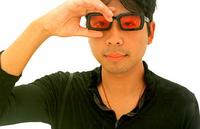| Always-on cameras - Sousveillance | 2004-04-03 05:27 2 comments |
 by Flemming Funch by Flemming FunchTon Zylstra recently commented on how the accepted norms around picture taking have changed. At least in a crowd of techies where everybody has at least one digital camera with them at all times. People no longer seem to mind constant picture taking. They mostly don't stop what they're doing and start posing. Which makes it easier to take good pictures of what is really going on. Personally I always have a problem when taking pictures. I'm in the middle of some experience, and I'd like to capture it. But the moment I pull out my camera, it is already a different experience and the presense of the camera changes it a bit. Just as much because of my own hangups as based on people's reactions. As, really, a lot of people no longer care. But I somehow never have a photographer identity. Somebody who is a "real" photographer doesn't hesitate in walking up front and sticking a camera in somebody's face, and hanging around a bit to get a good shot. But that is often because they don't consider themselves part of the action, but rather an independent observer who can float around as they wish, and who consider themselves having the right to photograph whatever is there. I'm usually a lot more self-conscious and try not to intrude. And I personally have a hard time being invisible. So often I don't get the pictures that were there to be gotten. What would appeal to me would be an always-on camera on my body that simply recorded everything I was seeing, and then I could go and pick out the good parts later. So I could then concentrate on my experiences, and I could reference the recordings based on my own peak moments, and go back and find the exact picture that best shows it. There are all kinds of issues in that, of course. Such as privacy. Is it ok to record people covertly? What if there was a light that showed that recording was taking place? See, it doesn't have to be a secret, but I'd like to get around the akwardness of the picture taking moment. If everything is recorded, both I and others will get used to it and not change our behavior. There's an article on Hewlett Packard's site about always-on cameras, and the various issues surrounding the idea. The privacy issues again. But they're also trying to address the technical issues of how to find the interesting moments. If you record what you did for 8 hours, chances are that most of it was really boring and not worth keeping. So, can some automated software tool help you pick out the good parts? Personally I don't care about that overly much. I'd be happy with the ability to scan through the recordings really quickly, and to reference them by time. I pretty much know what times were worthwhile, so I just need to be able to find them again, which I can do visually, if I can scan through the day in a couple of minutes. HP doesn't seem to be planning a product any time soon. But somebody will do it. Within less than five years, I'm sure. A tiny multi-gigabyte harddisk can quite well record video of your whole day. A high quality camera can quite well fit unobtrusively into a pair of glasses. The technical problems aren't hard. And if first a bunch of techheads start having these, and others think it is cool, there's no turning back. Despite that many people will have hesitations about allowing such things, I think there are many advantages and many side benefits. See Britt Blaser's idea of the Personal Flight Recorder. If lots of people have always-on cameras, continuously recording, crime as we know it will change. It is much harder to hide shadey dealings, much harder to deny what really went on. The key point is that these things will be in the hands of individuals, not some authoritarian government. Of course I'm trying to avoid thinking about scenarios where the FBI forces some backdoor to be built-in, so they can tap anybody's feed as they please. The answer is to put the technology into common use before they get around to demanding such things. .. Whaddya know, no sooner have I written the above before a couple of synchronistic and very related items show up. So, for more exciting stuff on that, see Britt's recent post on "sousveillance", and Joi Ito's mention of an International Workshop on Inverse Surveillance in Toronto April 12th. Exactly on these kinds of subjects. See this topic list: * Camera phones and pocket organizers with sensors;And here, from Britt is a comparison of surveillance and "sousveillance". Splendid word. Yeah, let's turn it all around. I love it. There's nowhere to hide from the people. |